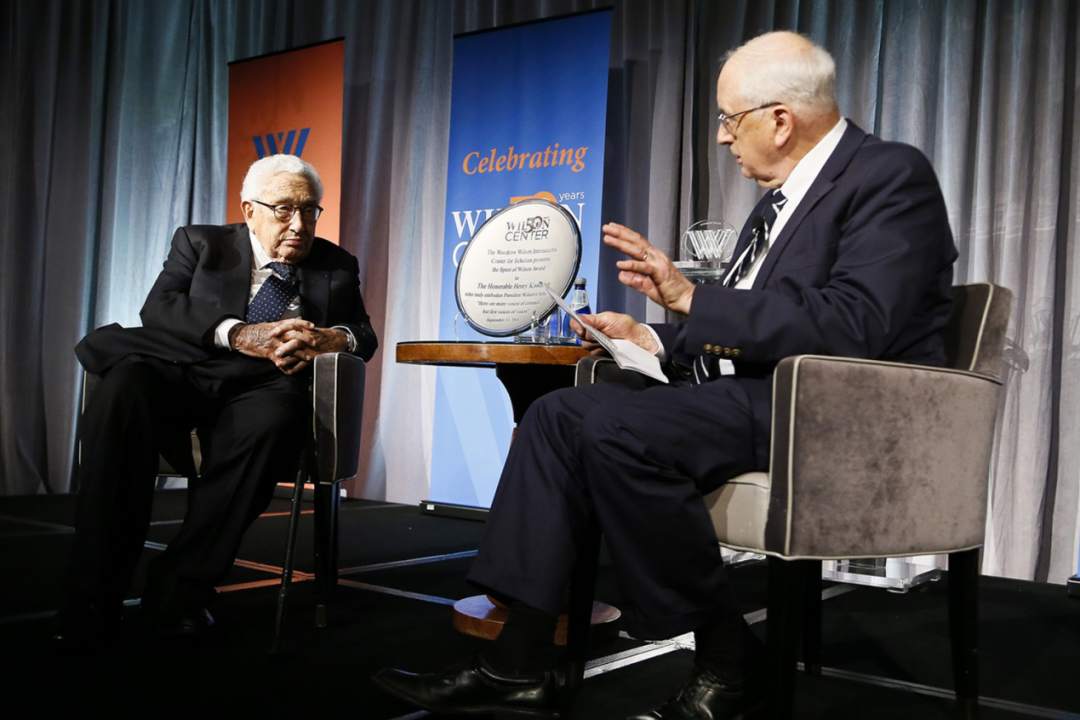Editor’s note: An anonymous Chinese correspondent who is based in Washington has expressed concerns about the direction of Sino-US relations. The correspondent wondered if US attitudes in past few months show the US is losing its strategic vision.
Here is a translation of the widely discussed letter published on domestic news site guancha.cn on Thursday:

Henry Kissinger shared his views on current Sino-US relations at the Wilson Center in Washington, DC on September 13, 2018. (Photo: guancha.cn)
Nearly a month ago former secretary of state Henry Kissinger stressed that the true aim of US-China bilateral relations has never been about which party might win over the other, but rather continuity, world order and world justice.
In the past few months, US policy toward China has undergone a huge U-turn. US political figures have claimed each and every exchange student from China is a spy. Major media have made claims about Chinese intelligence agencies, in which almost all American technology giants were involved.
A White House senior adviser even suggested that Chinese students no longer be issued study visas.
It is rather an irony that Washington has been busy with arrogant claims that the America is great again, but once the word “China” is mentioned, it speaks of itself as a serial victim.
US Vice President Mike Pence’s recent speech demonstrates this.
In fact, subtle changes recently had already prepared the Washington media for Pence's speech. Many Chinese who have lived in the US for a long time have started to talk more about a change in the climate there.
The White House has sloganeered against “political correctness.” However, it seems to be imposing another kind of “political correctness” against the Sino-US relationship. A tough attitude towards China has become the patriotic criteria for people in Washington….
A US scholar who has studied China’s economic and trade issues for a long time told a reporter that she was wondering if the quantitative research on the technical upgrade of Chinese enterprises still made sense as the idea of “technology theft” was unarguably marked as the absolute answer to the question.
Conversations with Americans from all walks of life has shown that Washington’s claim that “America loses” in trade with China was contrary to the thoughts of the majority of people.
Todd G Buchholz, an economist who served as White House director of economic policy under George HW Bush, hailed Sino-US trade in an event in Chicago. According to Buchholz, when he was a kid in New Jersey, he could survive the freezing cold winter thanks to China’s booming clothing industry. The industry signed trade deals with Walmart and exported down jackets to the US. Now as the trade war has intensified, and the US has extended tariffs on Chinese products, supermarkets such as Walmart and Target have issued markup alerts to US customers.
“Trade did not used to be the key issue during the past presidential campaigns. However, now it has become one of the political priorities in the country,” a former official at US Commerce Department said. “The current administration has politicized the trade issue, which is a danger sign.”
In the US today, the shift of direction of the country’s policy toward China is not an isolated incident, and there is a more complicated political and social transformation behind it. From the perspective of a journalist, a prominent phenomenon in US is that the intellectual community is extremely worried about the future of the country. Some commentators said that at present what troubles US the most is not the dispute between the left wing and the right wing but the conflict between openness and closure.
The world is changing these days, but the US is failing to follow on the right path.
As far as Sino-US trade is concerned, Pence repeated in his speech that "the United States suffers losses." However, the parts of the US that actually trade with China say "regardless of the federal government, we will continue to cooperate with China." It is not difficult to find that Washington's approach runs counter to the wishes of most ordinary people. The question at hand is, when will Washington regain its desire to find solutions to problems?
In a sense, the emergence of Sino-US trade disputes has made more Americans see the close relationship between the interests of the two countries.
While the US government’s confrontation with China is on the rise, more Americans believe that China and the United States should resolve their differences through dialogue and consultation.
The situation is stronger than people. Even for a nation as strong as the United States, it will be difficult to reverse the direction of the long trend of history.
Cover image: an aerial view is seen of the Washington Monument (R) with the White House (far L) and the Tidal Basin (foreground) in Washington, DC on July 4, 2018. (File photo: VCG)
(Compiled by Qu Qiuyan, Shan Xin and Dong Feng)


